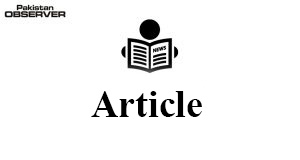Dr Sami Ullah
ONE prominent approach on cognitive psychological development is explained by “Law of Focus” which states that the performance of individuals is solely dependent on the focus of mind in routine activities. The output of each individual, whether he is a student, worker, manager or researcher, is highly determined by the state of mind, which further drives us in performing the assigned tasks. Majority of the people are negatively motivated and they conceive every task with negative wipes around them, they also focus on negative aspects of the tasks, which leads toward poor performance regarding the assigned tasks. On the other hand, many people are positively motivated and they can explore good things along with opportunities from every good or bad situation. High level of positive motivation can adjust low level of knowledge and skills toward professional excellence. Resultantly, state of mind is the predictor of output and if anyone can control on this skill, will become the excellent professional in job, society and even in domestic charms of life. Interestingly, there is no need of exercise, no medicine, no change in food or no change in life style is desired for psychological empowerment, we just have to switch the state of mind from negative to positive mode in our thinking, decision making, even in routine activities and feel the difference.
In current scenario of COVID-19, almost everyone is in the panic and feeling the depression around, which is creating hurdles in the way of economic wellbeing and happiness in daily activities. This panic and depression is mainly caused because of imperfect and unreliable information on the situation. There is huge difference in the sources of information in developed and developing economies, which further develops the state of mind of the individuals regarding any situation. The need of the day is to share exact information and coping strategies in the time of crisis for minimizing the confusion and panic in the general public. As per the BBC reports and World Bank data, 81% people in the UK and 80% people in the US are using internet, whereas only 15% people in Pakistan are using it. On the other hand, 69% people in urban areas and 11% people in rural areas have access to cable TV in Pakistan. This information is showing the huge gap in accessing the perfect information in developed and developing countries. The people in developing economies are at the highest level of risk in terms of employment (majority have vulnerable employment), instable income sources, volatile output in agriculture and rural backwardness, lack of basic needs and limited access to public services (health, education and infrastructure), institutional inefficiency and political instability. For this reason, people have to manage all the desires within their budgets and limitations. So, the people in developing economies are already under crisis in almost all the time and COVID-19 is not putting too much pressure on the people of developing economies like Pakistan.
When state is not supportive then it is core responsibility of the head of the family to support in meeting the basic needs. The other side of the picture is entirely different where the State is very supportive and facilitate the public in basic needs, education attainment, health facilities, business development and in the hard times also. In this situation, people are mentally very relaxed and the current situation of COVID-19 is hard to manage for the people of developed countries. In this situation, the people of developing countries are found to be emotionally very strong with limited panic in routine activities with minimum effect on their health and the situation is opposite in developed regions. In current scenario of Pakistan, we have 60% population under the age of 30 years, which is nearly 120 million and they are severely affected by this COVID-19 on psychological and emotional grounds. They are in panic, depression and emotional imbalance created by media. They are also depressed on the health facilities which we currently have and if the situation gets worse, what would happen? Such type of questions are putting pressure on our youths, the potential pillars of our economy, and this is the right time to tackle them in psychological perspective of empowerment. This is prime responsibility of the state leaders to develop and launch the strategy for emotional stability and strength of the people, especially the youth because they have to start their career soon.
We can launch many coping strategies to minimize the impact on economic and psychological aspects of the crisis. For this purpose, our media and higher education institutions can be availed because both have technical and supportive instruments for convincing the general public. There is also dire need to prepare our youth for handling such pandemic in the future through well designed training modules and series of workshops through digital modes of circulation. When our government is planning to support the people financially during the lock down, they have to include the psychological wellbeing in the priority areas otherwise mentally ill people are more tough to manage during work after the crisis. Higher Education Commission (HEC) of Pakistan may introduce some compulsory courses in all the degree programs regarding psychological and economic management during crisis. Developing countries are facing many crises each year, in the shape of floods, earthquakes, food shortage, cyclical unemployment, severe weather, political instability, etc and if HEC introduces such sort of courses, it will be helpful in managing the bad impact of crisis by engaging the educated youth in future. At this stage, it is also the core responsibility of institutions to design policies for the development and sustainability of Pakistan.
—The writer is Assistant Professor in Economics, University of Gujrat.










